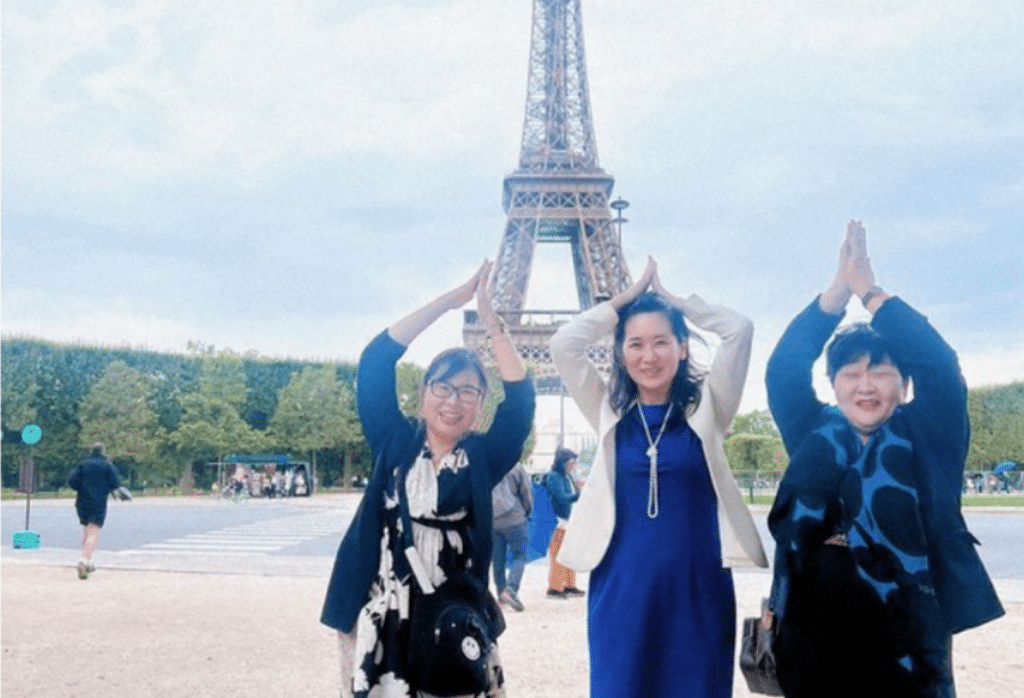Last month, a group of women from Japan’s ruling Liberal Democratic Party’s (LDP) Women’s Affairs Department went on a short training program to France to exchange ideas with French legislators and government officials about social issues pertaining to women, including early childhood education, parenthood, and feminism in politics.
The group of 38 women was led by the House of Councillors member Rui Matsukawa, who heads the LDP’s Women’s Affairs Division in Japan.
During the study tour, Matsukawa reflected upon the trip on her socials, describing it as “very meaningful to exchange opinions with French legislators and government officials on issues such as compulsory early childhood education from the age of 3, measures to combat the declining birth rate, and women’s empowerment in politics.”
Accompanying the post was a picture of herself with two other colleagues in front of the Eiffel Tower with their arms raised, evidently to imitate the tower.
“With my fellow members from Osaka,” she wrote.
Who knew that such an innocent and playful snapshot would cause outrageous levels of backlash from people in Japan?
First reported in the leading Japanese newspaper, The Asahi Shimbun, the picture was condemned by members of the public, some calling it “a deviation from public standards.”
Other comments include, “They look too excited,” “Is this a company trip?” and “I feel nothing but disgust.”
Some questioned the legitimacy of their study trip, posing the question: “What the heck is this pose? If you are traveling with your buddies, please go at your own expense.”
Another wrote — “Do you send your messages knowing the reality that ordinary people can’t afford to travel abroad?”
Yet another compared the picture to “a school trip.”
“How could she (post such flippant photos) while people are struggling with tax hikes and high prices?” one commenter asked.
It seems that often, the smallest actions made by female politicians are criticised by absurd and disproportionate opposition.
One male political commentator told Asahi Shimbun, “[Matsukawa] should never have posted photos that could be interpreted as a sightseeing trip.”
“Given that the party sent them, taxpayer’s money could have been used in the form of political party subsidies,” he explained, adding, “Considering the fact that the high cost of living has made it difficult for some people to travel abroad, Matsukawa could have anticipated the kind of reaction her photos would generate.”
A few days after her original post, Matsukawa released a public apology on her socials, writing,
“I am sorry that my posts have caused misunderstanding about the training program, even though it is a serious and substantial one.”
“The 38 participants are local legislators and citizens who belong to women’s affairs divisions nationwide and who are in leadership roles there. The cost of the tour was covered by the party and each participant paid their own expenses.”
Facing reporters in Tokyo earlier this month, Matsukawa said she had spoken to the chairwoman of the LDP’s Party Organization and Campaign Headquarters, Yuko Obuchi, and deleted some of the images from her Paris trip from her socials.
“I apologise for causing any misunderstanding,” she said. “I didn’t mean to give the impression that the trip was anything but a serious program full of content.”
The whole affair is reminiscent of the backlash Finland’s Prime Minister, Sanna Marin faced last year after two private videos were leaked showing her partying with friends at a house gathering and at a famous night-club in Helsinki.
You can see for yourself that the picture of Matsukawa and her colleagues is undeniably playful and fun. When every part of a woman’s actions is picked apart and analysed, is it no wonder Japanese women are reluctant to enter office?
The latest World Economic Forum report measuring gender parity ranked Japan 125th out of 146 countries — its gender parity in political engagement was one of the world’s lowest, at 138th. Among Tokyo’s 23 mayors of the main districts, only three are women.
Satoko Kishimoto, the first female mayor in the history of Suginami, told BBC earlier this year: “We have to recognise as a national crisis this under-representation of women in politics. Women’s representation has stayed almost the same for 75 years.”
“I really want to debate policies,” she added. “But [a lot of] time is wasted in the city council addressing criticism and personal attacks.”
Politicians have a right to fun, just like anybody else. Unfortunately, presenting an authentic image of yourself as an ordinary, playful human travelling to a foreign country is too much for some.



